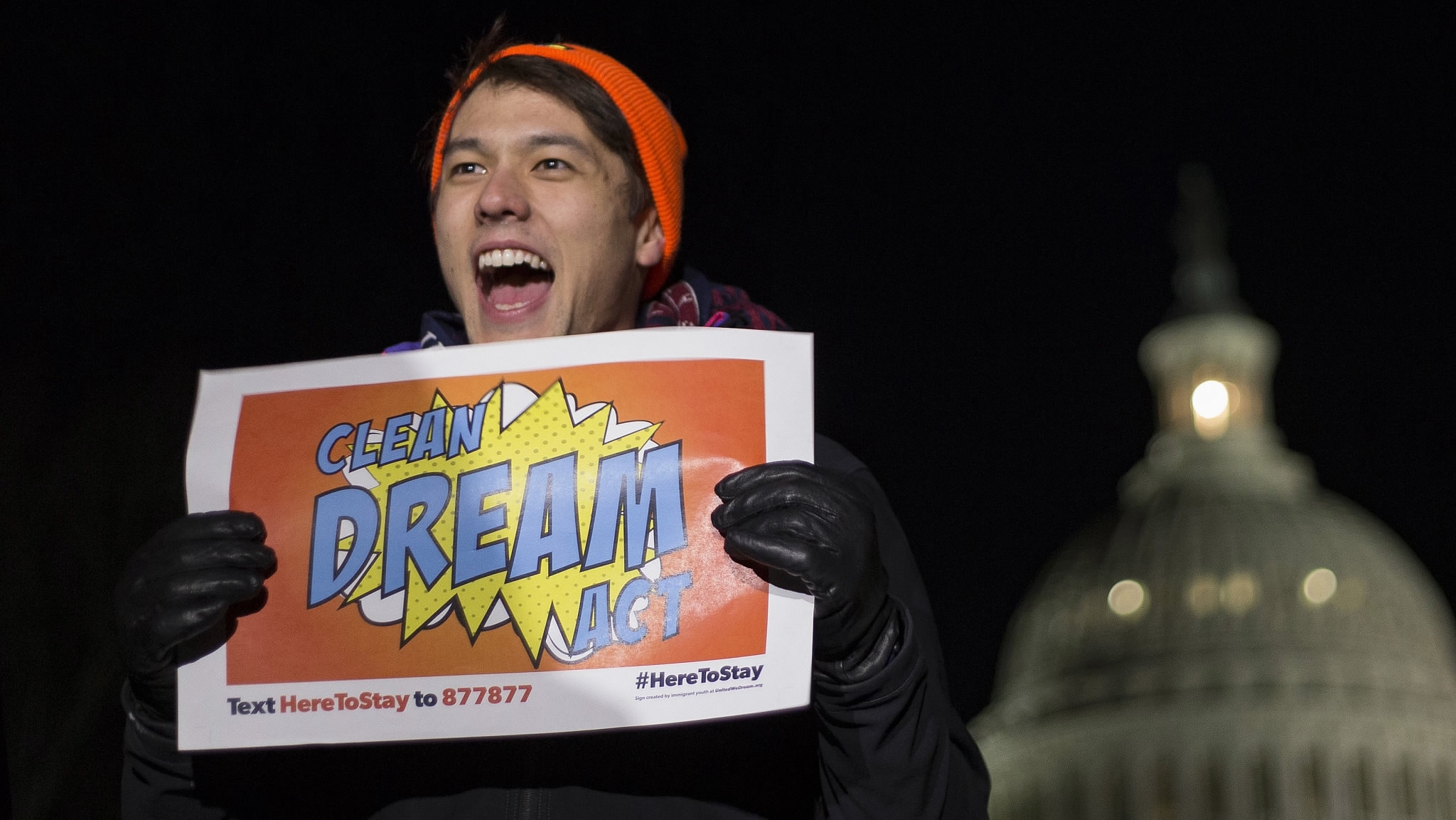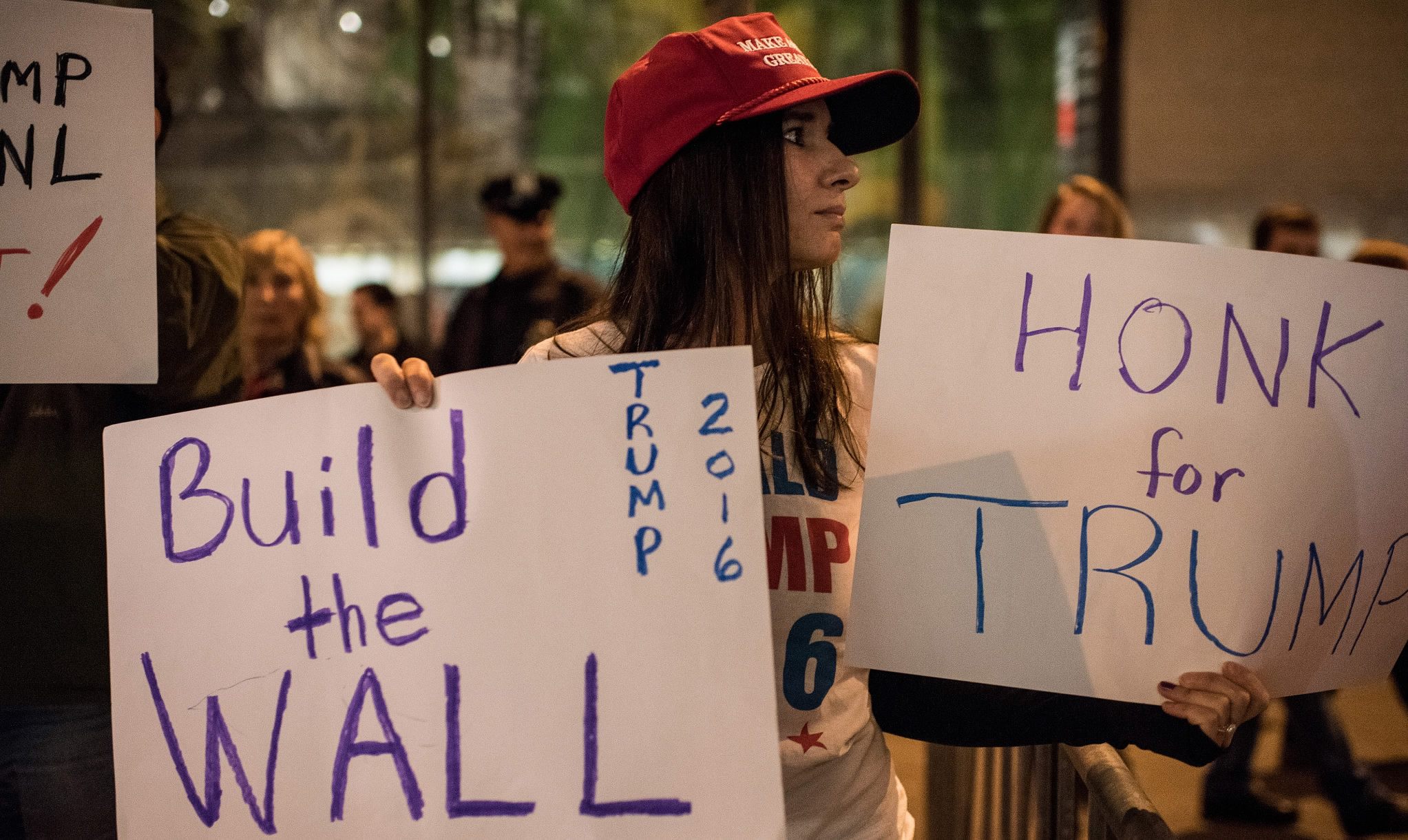
Politics
12:22, 25-Jan-2018
Trump floats 'Dreamers-for-wall' deal to end immigration impasse
By John Goodrich

US President Donald Trump sought to burnish his reputation as a dealmaker on Wednesday by revealing the compromise he was willing to make to strike a bipartisan deal on immigration.
The president told reporters he was open to granting the Dreamers – around 700,000 people brought to the US illegally as children – a path to citizenship in exchange for funding for border security, a shift from his hardline immigration policy that could open the door to a breakthrough.
White House spokeswoman Sarah Sanders said earlier that an immigration framework that both Republicans and Democrats can support will be unveiled on Monday.

US President Donald Trump. /VCG Photo
US President Donald Trump. /VCG Photo
Negotiations continue behind-the-scenes in Congress, and the framework may act as a guide to what Trump is willing to accept.
A dispute over immigration contributed to the failure to pass a spending bill that led to a three-day government shutdown. The government will shut down again if no deal is reached by February 8.
What's the proposal?
Trump told reporters he wanted 25 billion US dollars to build a wall at the border with Mexico and a further five billion US dollars for additional border security in exchange for protection for the Dreamers.
Sanders said the immigration framework will “fulfill the four agreed-upon pillars: securing the border and closing legal loopholes; ending extended-family chain migration; cancelling the visa lottery; and providing a permanent solution on DACA (Deferred Action for Childhood Arrivals).”
The full details of the White House immigration plan will be released on Monday.
What’s the plan for the Dreamers?
Trump gave a six-month deadline in September for Congress to come up with an alternative to the Obama-era DACA program which protected Dreamers from deportation, having campaigned on a promise to cancel it on his first day in office.
DACA is due to expire on March 5, but the president said on Wednesday he may be willing to extend the deadline if an immigration deal looks possible.

A DACA supporter at a rally outside the US Capitol on January 19, 2018 in Washington, DC. /VCG Photo
A DACA supporter at a rally outside the US Capitol on January 19, 2018 in Washington, DC. /VCG Photo
The Washington Post reported that Trump suggested the White House plan would grant provisional legal status to Dreamers and give them an "incentive" of citizenship in 10 to 12 years.
"We’re going to morph into it," Trump said. "It’s going to happen — over a period of 10 to 12 years. If somebody's done a great job and worked hard, it keeps the incentive to do a great job. I think it's a nice thing to have the incentive, after a period of years, of being able to become a citizen."
Is this a breakthrough?
The White House said the plan to be published on Monday was based on “dozens of conversations” with congressional Democrats and Republicans -- but Democrats said they had not been consulted on the details.
Senate Minority Leader Chuck Schumer, who led Democrats to end the shutdown on Monday in exchange for a debate on the Dreamers, said lawmakers were “starting over.”

Twitter Screenshot
Twitter Screenshot
The White House last week rejected Schumer’s offer to grant around 20 billion US dollars for border security in exchange for protection for the Dreamers. On Tuesday, he told reporters that “the wall offer’s off the table.”
There is widespread support for finding a solution for the Dreamers, however, both in Congress and in the country. A recent CBS News poll suggested 87 percent of Americans were in favor of allowing Dreamers to stay in the US.
Republican Senator Lindsey Graham, a leading voice on immigration reform, said he had “never felt better about our chances of finding a solution on immigration” after Trump’s comments.

Twitter Screenshot
Twitter Screenshot
However, there has previously been support for extending legal protections to a far greater number of people – an estimated one million people eligible for DACA did not apply.
In addition, the plan suggests agreement on DACA is contingent on authorizing billions of dollars in funding for a border wall and curtailing legal immigration – issues some Democrats will find hard to stomach.
Is Trump breaking a promise?
Trump won the presidency on a platform that featured a hardline stance on immigration, criticism of the compromise that underpins traditional politics and his reputation as a dealmaker.
The DACA program put him in a difficult position – he promised to end it on his first day in office, but after the election gave Congress six months to find a solution.

A supporter of Republican Presidential candidate Donald Trump on November 7, 2015. /VCG Photo
A supporter of Republican Presidential candidate Donald Trump on November 7, 2015. /VCG Photo
Should the White House plan be adopted, the president would move a step closer to fulfilling his signature campaign pledge of building a border wall and he could claim the agreement was proof of his ability to cut deals in Washington
However, while finding a solution for the Dreamers is broadly popular in the US, a path to citizenship is likely to be painted as an amnesty by some of those who make up Trump’s base of support.
The right-wing Breitbart website in early January said that Trump’s willingness to offer a deal on the Dreamers “breaks a long-held commitment by the populist leader to put American citizens first.”
11160km

SITEMAP
Copyright © 2018 CGTN. Beijing ICP prepared NO.16065310-3
Copyright © 2018 CGTN. Beijing ICP prepared NO.16065310-3